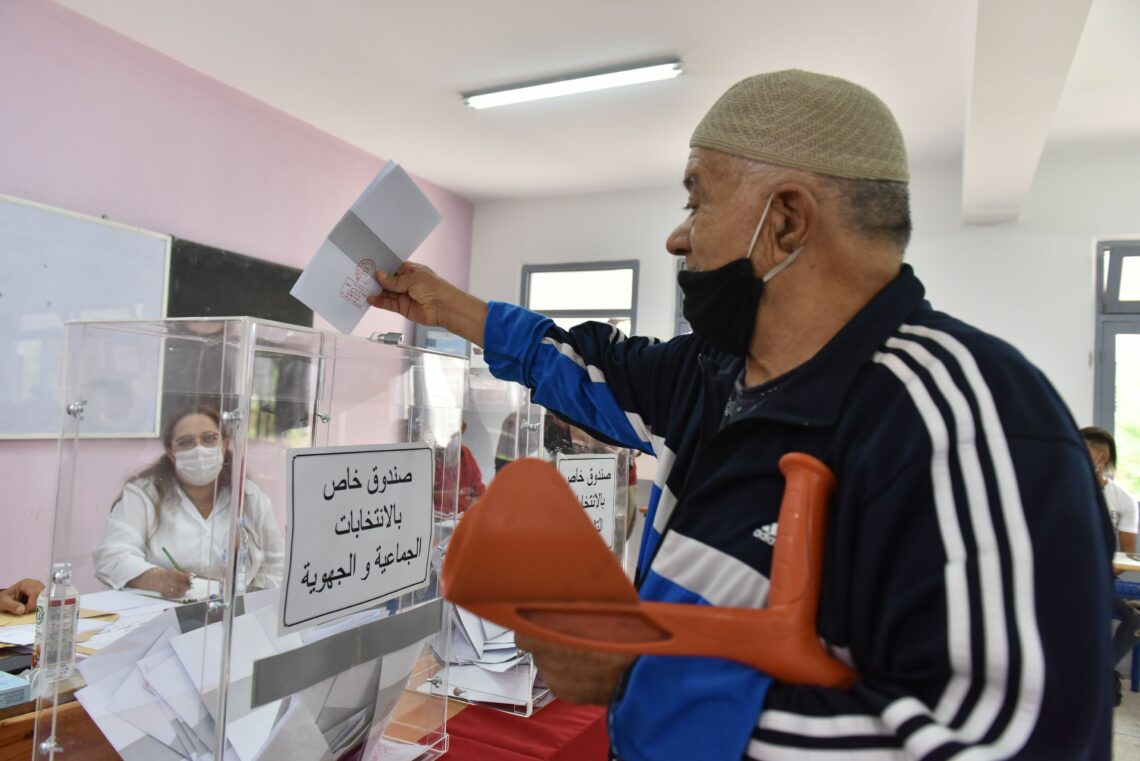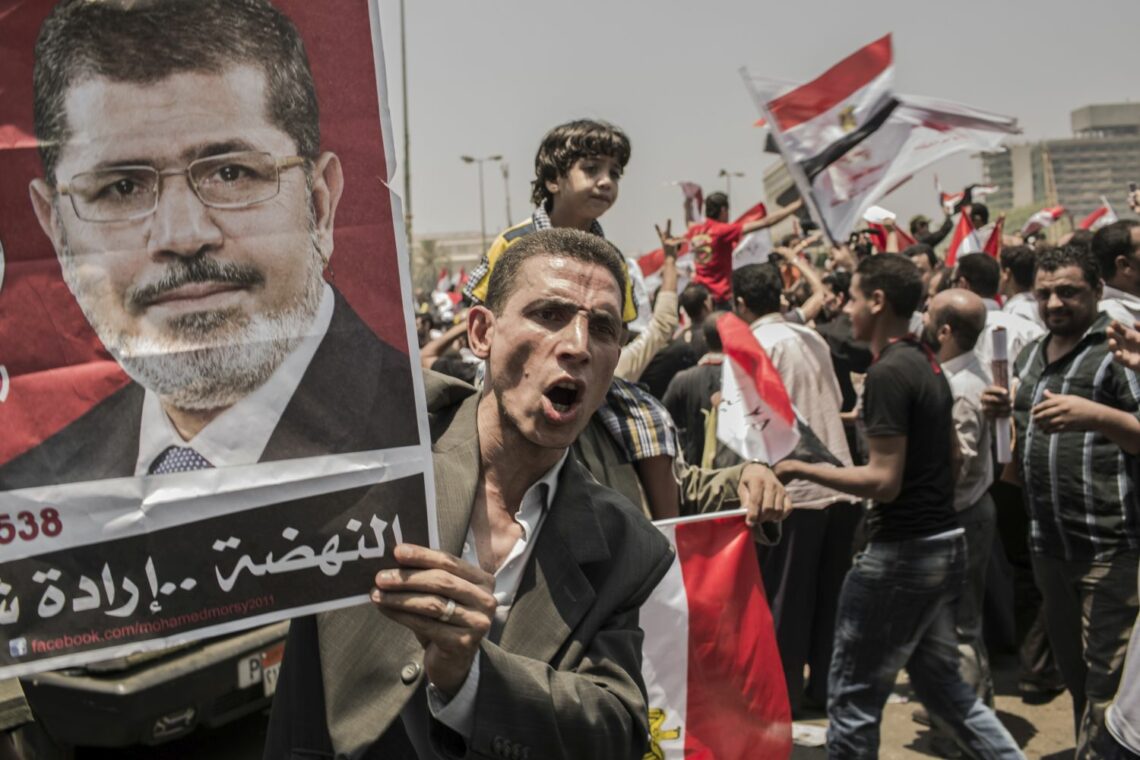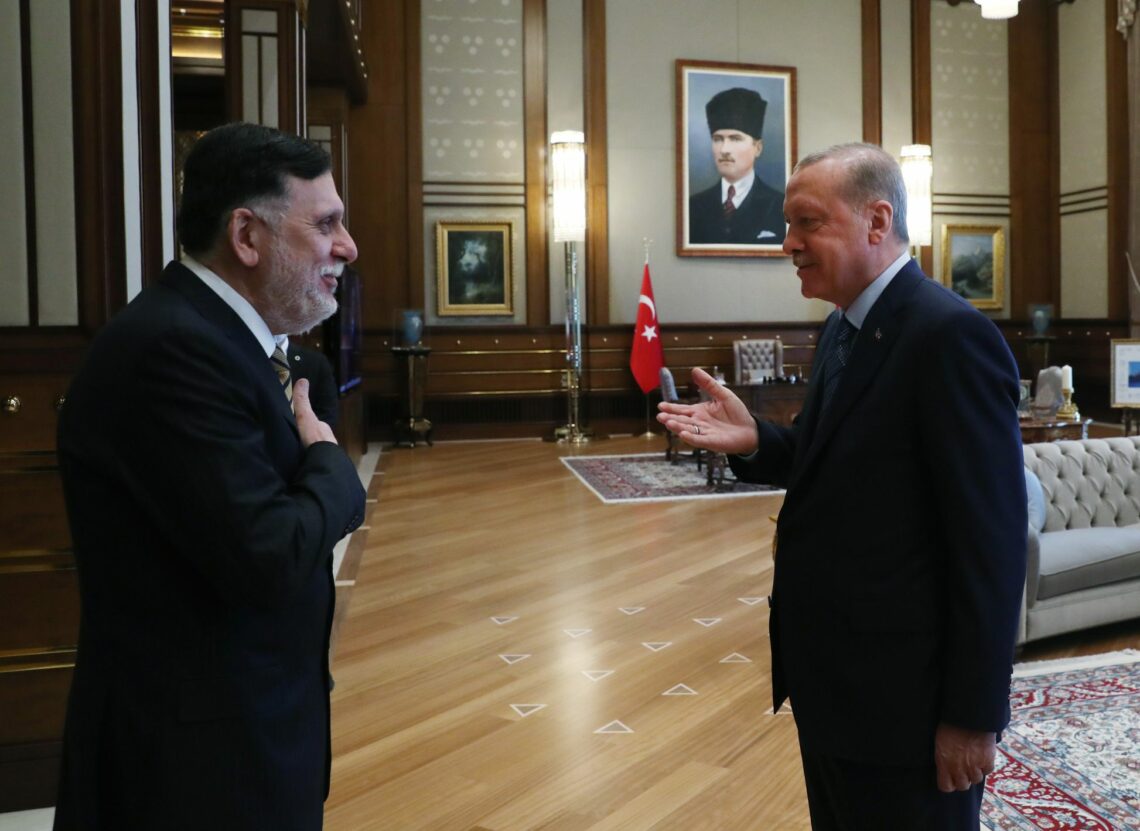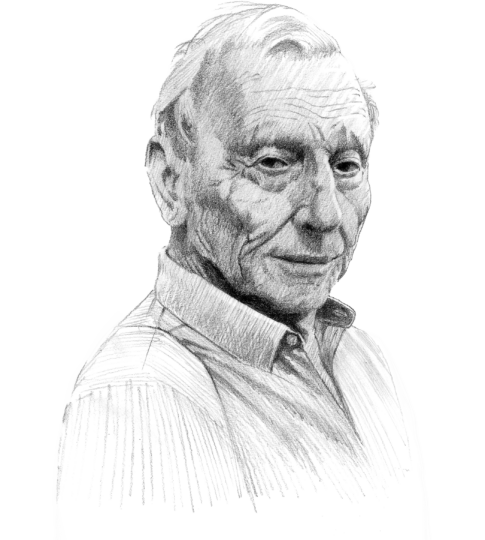The Muslim Brotherhood’s waning influence
Swept into power across North Africa on the heels of the Arab Spring, parties backed by the Muslim Brotherhood ruled for several years. Some now say the group’s golden age is over, but it still holds sway in places like Turkey and Qatar.

In a nutshell
- Muslim Brotherhood-backed governments are falling
- Most were unable to address everyday economic concerns
- The group still receives strong support in Turkey and Qatar
In early September, Moroccan voters dealt a crushing loss to the ruling party, Justice and Development, leaving it with just 13 seats of the 125 it had held in parliament. The party, known as the PJD, advocates for political Islam and until 2013 was an official branch of the Muslim Brotherhood. Its defeat brought an end to what some had called the movement’s golden age in North Africa and the Middle East.
A little more than a month earlier, on July 26, Tunisian President Kais Saied had dismissed Prime Minister Hichem Mechichi and suspended parliament, where the Muslim Brotherhood-backed Ennahda party was dominant. Back in 2013, then-Defense Minister Abdel-Fattah El-Sisi of Egypt had ousted that country’s president, Mohammed Morsi, and branded the Muslim Brotherhood, of which Mr. Morsi was a member, a terror organization.
In each case, it was the inability to govern that caused the downfall of parties and politicians associated with the Muslim Brotherhood. Most had come to power following the 2011 events known as the Arab Spring. Yet their success, achieved peacefully through democratic elections after 80 years of persecution and violent clashes, had resonated throughout the Muslim world. It had become apparent that the people trusted these parties and believed that under the mantle of Islam, they would bring an end to dictatorship, corruption and economic disaster. However, their stunning victory had found them unprepared for the reality of government.
Muslim Brotherhood-backed parties followed slogans like ‘Islam is the solution,’ without considering the situation on the ground.
They had no blueprint for the economic and social programs needed to develop their countries. Instead, they followed slogans they had coined themselves such as “Islam is the solution,” without considering the situation on the ground. They focused on entrenching themselves as fast as they could throughout the government and security apparatus. Often, their goal was to establish an Islamic regime rooted in sharia. None of this, however, helped alleviate dire economic difficulties or stop rampant corruption. Renewed popular protest was met with violent repression until it ultimately led to their downfall.
History
The Muslim Brotherhood was founded in 1928 in Egypt by Hassan al-Banna, a teacher turned preacher. He taught that Islam could be applied to all facets of life, and believed that it should be imposed on the world – through jihad if necessary. According to him, the faithful should aspire to return to the way of life of their ancestors at the time of the Prophet Muhammad. Sayyid Qutb, the movement’s most important ideologue, rejected all things Western because democracies do not accept the supremacy of Allah over the laws of humankind. Thus was born modern political Islam.
The philosophy that the Muslim Brotherhood promoted was an instant success, due in part to a desire throughout the Arab world for a new Islamic structure following the Ottoman Empire’s dissolution and Kemal Ataturk’s abolition of the caliphate. But its basic premise, that the country and the people should be ruled according to sharia, clashed with nascent Arab nationalism and secularism in countries gaining independence after centuries of Turkish domination.
Soon the members of the Muslim Brotherhood were persecuted by the new regimes. In Egypt, matters came to a head in 1954 following a failed attempt to assassinate President Gamal Abdel Nasser. The movement was disbanded, thousands of its members were arrested and its leaders fled to more religious countries like Qatar and Saudi Arabia, where they rapidly gained legitimacy. They established branches throughout the Arab world, as well as in Europe and the United States. The Brotherhood would set up much-needed charity organizations to help the poor, growing its influence.
Egypt
It was not until 2011, however, that the Muslim Brotherhood found itself officially in control of a country. It happened in Egypt, at the height of the Arab Spring, the result of democratic elections. Along with a religious extremist Salafi party and smaller Islamic groupings, it mustered 70 percent of the seats in the country’s parliament.

A few months later, in May 2012, Mohammed Morsi was elected president. He immediately set about taking over all aspects of central and local government. Posts in the education and communications ministries were handed to members of the Brotherhood. Security forces had to accept recruits from the movement that had previously been banned from joining. President Morsi issued presidential decrees giving himself increasing legislative and judicial powers. Parliamentarians debated whether to implement sharia-based corporal punishment. Meanwhile, the economic situation worsened.
Opposition grew and coalesced into a block uniting several factions. This led to a succession of large demonstrations, which the government quelled with ferocity. The country was on the brink of the abyss. At this point, the army, led by Defense Minister El-Sisi, took over, ousted President Morsi and established a new regime.
During this period, Muslim Brotherhood militants conducted violent attacks, with hundreds of victims. The new government branded the movement a terror organization, disbanding its political party and seizing its property. Muslim Brotherhood leaders who did not flee to Turkey or Qatar in time were jailed. The failure of what had been touted throughout the Muslim world as a triumph of the Brotherhood after 80 years left a deep scar on its sister parties in North Africa.
Tunisia
The fall of Tunisia’s Ennahda party was in large part a continuation of what happened in Egypt. It too came to power after its president, Ben Ali, was toppled during the Arab Spring in 2011. It garnered 37 percent of the vote in the elections that followed, taking 89 out of 217 seats in parliament, and was able to form a government. But here too, the Muslim Brotherhood-backed party proved ill-suited to tackling economic woes. Instead, it gave free rein to Salafi extremist groups, who later came under suspicion of having murdered two members of the liberal opposition. Ennahda was also accused of having a secret organization to infiltrate the security forces. The ensuing crisis led to mass demonstrations and growing instability.
Worried about a repeat of the events in Egypt would happen in Tunisia, the government resigned in 2014. In the ensuing elections, Ennahda garnered just under 28 percent of the vote. Though it was still able to form a coalition, it failed again to address the ongoing economic crisis.
In the 2019 elections, Ennahda received less than 20 percent of the vote.
Faced with growing opposition, the party took the extraordinary step in 2016 of convening its first-ever general assembly. The 1,200 attendees adopted a motion to separate religious and political matters, with the government focusing on the latter. Rached Ghannouchi, who was reelected as party president, said that Ennahda no longer claimed to represent political Islam, but was a “political, democratic and civilian party based on modern, Muslim and civilized values.”
However, that was not enough to shore up its support. In the 2019 elections, Ennahda received less than 20 percent of the vote. It was able to join the ruling coalition, but the squabbling parties were once again unable to tackle the economy. On July 26, 2021, President Kais Saied dismissed the prime minister and suspended parliament, ending the political role of Ennahda and the Brotherhood in Tunisia, for now.
Morocco
In Morocco, the PJD was remarkably successful in the 2011 and 2016 elections, after which it formed a government in both cases. Though Prime Minister Abdelilah Benkirane adopted a moderate policy, he was unprepared to deal with his country’s economic problems. Internal squabbles weakened his party. He resigned in 2017 but his successor, Saadeddine Othmani, did no better. In elections held on September 6, 2021, the party lost 90 percent of its seats – a massive demonstration of rejection and distrust.
Libya
Libya’s Muslim Brotherhood branch, established in 1949, remained dormant for decades. The country’s brutal ruler, Muammar Qaddafi, persecuted Islamic groups and kept them from becoming a political force. It was not until March 2012, a few months after his fall from power, that it formally created the Justice and Construction Party (JCP). In elections held that year, with a dozen political formations competing, the party placed second, with its representatives gaining 34 of the 200 seats in the General National Congress.
The JCP subsequently allied itself with independent Islamic representatives to form a bloc opposing nationalist parties. It vainly tried to pass legislation preventing former members of the Qaddafi administration – including those who had been elected to the new parliament – from participating in politics for 10 years.
In the 2014 election, it lost nine seats and was unable to join the government. It decided to establish an alternate governing body, the National Salvation Government, backed by three of the largest Islamic militias that had united behind the party and taken over the capital Tripoli. The new parliament, called the House of Representatives, had to flee, eventually settling in Tobruk near the Egyptian border, under the protection of General Khalifa Haftar. Soon, the country became embroiled in a civil war, exacerbated by foreign intervention. The United Arab Emirates and Egypt backed General Haftar against forces backed by the Muslim Brotherhood. General Haftar’s forces later received Russia’s support while Turkey supplied Islamic organizations with weapons.

In 2016, under pressure from the United Nations, a Government of National Accord was established. It was led by Fayez al-Sarraj, with the support of the Muslim Brotherhood and Islamic militias. General Haftar, at the head of the country’s largest armed force, did not accept this outcome and renewed his efforts to take Tripoli. Turkey dispatched Syrian mercenaries to rescue its ally, and General Haftar’s forces failed. A cease-fire was achieved, and a new interim government was established, tasked with preparing general elections that are scheduled for December 24, 2021. Considering the level of enmity between the two sides, they may not take place. Nevertheless, there are signs that the Brotherhood’s influence is on the wane.
Sudan
In Sudan, the National Islamic Front was one of the main parties in power after 1983, when then-President Jaafar Nimeiry imposed sharia on the country, including the Christian south. The ensuing civil war lasted 22 years and ended in 2005, with the division of the country and the creation of predominantly Christian South Sudan. After the ouster of President Omar al-Bashir in a 2019 coup, the Muslim Brotherhood-backed party lost most of its influence. It is not expected to do well in the next elections, if they are eventually held.
Algeria
In Algeria, the Muslim Brotherhood-backed Islamic Salvation Front (FIS) nearly came to power after winning the first round of elections in 1991 with 48 percent of the vote. However, the government canceled the second round, saying it feared the “end of democracy.” (Ironically, however, the military essentially took control of the country.) FIS refused to accept the decision, leading to a protracted civil war with more than 200,000 casualties. Government forces eventually prevailed. By 2002, the war was over and Islamic parties had become irrelevant .
Strategic outlook
The Muslim Brotherhood has not come close to achieving its aims anywhere else in the region. Hamas, an offshoot of the Egyptian Muslim Brotherhood, still rules the Gaza Strip. However, it did not come to power through popular consent, but through a bloody coup. Bent on destroying Israel, it does little for the economy and for the people who live there. It is dependent on international aid.
Religion is now competing with aspirations for a better life in a modern, developed country.
Ousted from power almost everywhere it has held it, the Brotherhood still enjoys strong support from Turkey and Qatar. President Recep Tayyip Erdogan dreams of rebuilding Turkish dominance across the Arab world and sees the Brotherhood as an ally in achieving this goal. Turkey gave sanctuary to Muslim Brotherhood militants fleeing Egypt and today hosts members of Hamas.
Qatar has been a staunch supporter of the movement since it welcomed the first wave of Muslim Brothers fleeing Nasser’s wrath in the 1950s and has since developed even closer ties to the organization. The Al Jazeera media network was established with their support.
Still, the teachings of al-Banna and Qutb have given rise to some of the most extremist jihadi organizations, from al-Qaeda to Islamic State. These groups are not as powerful today as they once were, but remain extremely dangerous – as their activities in Africa and Afghanistan have made clear. Europe has had its share of terror attacks inspired by groups such as these but is yet to confront the threat.
Religion is still a potent factor in Islamic countries, but it is now competing with aspirations for a better life in a modern, developed country. Early in the 19th century, clerics and preachers had tried to find a compromise between Islam and modernity but failed. Much of the Muslim world is still struggling with religious and political turmoil, with no solution in sight. Can the Muslim Brotherhood, which represents one of the strongest currents in Islam, rebound from its present state? It would need to learn from its mistakes and prepare its members for the task of governing a country.






